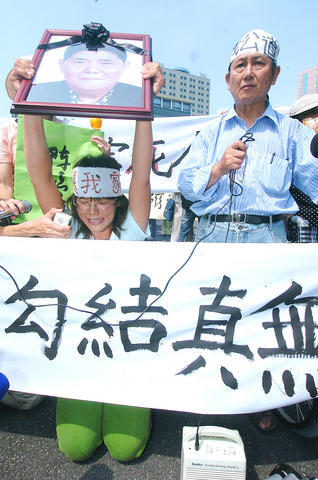More than 20 environmental protection activists petitioned the Executive Yuan yesterday, requesting the government lay out stricter measures regulating electromagnetic waves (EMW).
"The regulations governing EMW are not strict enough. Unfortunately, the government will not do anything about it," said Chen Jiau-hua (
"As there are an increasing number of cellphone towers, the electromagnetic waves are getting stronger in the environment. It is quite ridiculous that the government is now planning to establish more than 10,000 WiMAX towers before we have laws for EMW related issues," she added.

PHOTO: LIU HSIN-DE, TAIPEI TIMES
WiMAX stands for "worldwide interoperability for microwave access." It aims to provide wireless data over long distances, in a variety of different ways, from point to point links to full mobile cellular type access.
In its petition, the union submitted five requests.
It asked the National Communications Commission not to issue operating licenses for any WiMAX towers before the government guarantees that their EMW are harmless and requested that existing cellphone towers decrease their strength to six volts per meter.
Those aged 16 and below must not be allowed to use cellphones, the group suggested.
The group also asked the government to postpone the establishment of campus wireless Internet networks before the technology is proved to be harmless and relocate cellphone towers, power stations and high-voltage power line towers away from campuses, residential areas and hospitals.
The union provided a list of people who had died of cancers, which they alleged were related to EMW pollution.
The union said that the people lived close to Chianan Church in Chiayi City, which has a large cellphone tower on its roof.
The statistics provided by the group showed that 12 residents died of cancer between 2004 and this May.
"There is insufficient evidence to prove that these residents died from the effects of electromagnetism, but no one can guarantee that their cancer had nothing to do with it either," Chen said.

ANOTHER EMERGES: The CWA yesterday said this year’s fourth storm of the typhoon season had formed in the South China Sea, but was not expected to affect Taiwan Tropical Storm Gaemi has intensified slightly as it heads toward Taiwan, where it is expected to affect the country in the coming days, the Central Weather Administration (CWA) said yesterday. As of 8am yesterday, the 120km-radius storm was 800km southeast of Oluanpi (鵝鑾鼻), Taiwan’s southernmost tip, moving at 9kph northwest, the agency said. A sea warning for Gaemi could be issued tonight at the earliest, it said, adding that the storm is projected to be closest to Taiwan on Wednesday or Thursday. Gaemi’s potential effect on Taiwan remains unclear, as that would depend on its direction, radius and intensity, forecasters said. Former Weather Forecast

As COVID-19 cases in Japan have been increasing for 10 consecutive weeks, people should get vaccinated before visiting the nation, the Centers for Disease Control (CDC) said. The centers reported 773 hospitalizations and 124 deaths related to COVID-19 in Taiwan last week. CDC Epidemic Intelligence Center Director Guo Hung-wei (郭宏偉) on Tuesday said the number of weekly COVID-19 cases reported in Japan has been increasing since mid-May and surpassed 55,000 cases from July 8 to July 14. The average number of COVID-19 patients at Japan’s healthcare facilities that week was also 1.39 times that of the week before and KP.3 is the dominant

The Chinese Communist Party’s (CCP) working group for Taiwan-related policies is likely to be upgraded to a committee-level body, a report commissioned by the Mainland Affairs Council (MAC) said. As Chinese President Xi Jinping (習近平) is increasingly likely to upgrade the CCP’s Central Leading Group for Taiwan Affairs, Taiwanese authorities should prepare by researching Xi and the CCP, the report said. At the third plenary session of the 20th Central Committee of the CCP, which ended on Thursday last week, the party set a target of 2029 for the completion of some tasks, meaning that Xi is likely preparing to

US-CHINA TRADE DISPUTE: Despite Beijing’s offer of preferential treatment, the lure of China has dimmed as Taiwanese and international investors move out Japan and the US have become the favored destinations for Taiwanese graduates as China’s attraction has waned over the years, the Ministry of Labor said. According to the ministry’s latest income and employment advisory published this month, 3,215 Taiwanese university graduates from the class of 2020 went to Japan, surpassing for the first time the 2,881 graduates who went to China. A total of 2,300 graduates from the class of 2021 went to the US, compared with the 2,262 who went to China, the document showed. The trend continued for the class of 2023, of whom 1,460 went to Japan, 1,334 went to